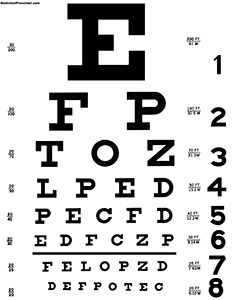
I’m pleased to say that I have some information that will take a lot of the stress off going to your optometrist for an eye exam. I’m not talking about all the stress. He’s still going to try to touch your eyeball when you’re looking away.
He does this so he can gauge the pressure inside your eye, like you would gauge tire pressure, but unlike with tires, he can’t kick it. So he slowly touches it, and then he flat out denies that he did it.
“No, I didn’t touch your eye, I just got really close.”
He’s not checking for air, though. He’s checking for a fluid called “aqueous humor,” which is one of the four humors, the other three being blood, pus and people stepping on a rake and having it hit them in the face.
But the whole exam is not very relaxing in the first place. First he leans in uncomfortably close to your face and stares you in the eyes. It’s very awkward. Anyone else in the world does this, and you punch them in the nose. And then he shows you an eye chart and tells you to read it.
I’m never sure how to respond. “Am I supposed to try to pronounce the word, or just tell you the letters? I don’t actually know how to pronounce that. Do you have one that’s maybe written in English?”
After the eye chart, the doctor puts drops in your eyes, so he can determine whether you panic when people put in drops. He does this to dilate your eyes and make your pupils larger, so he can see into your brain. The drops do have a side effect, though: They make it very hard to read things up close. But it takes a while for the drops to kick in, so he tells you to go out to the waiting room and read pamphlets about what kind of scary things it can mean when your vision starts going, while your vision slowly fades and you can’t read the pamphlets anymore.
And at the end, he gives you a prescription, which you can then choose to fill while you’re there, in which case I suggest you bring along someone you trust very dearly to tell you whether the glasses you’re trying on make you look like someone who just arrived from whichever Eastern European nation is printing the eye charts.
I recently went for an eye exam, because it’s been awhile since the last one, and I spend most days staring at white space on my computer screen and trying to fill it with black space. I went to Dr. Jacobowitz, because he fixes my kids’ glasses whenever they break, which is about six times a week. But I must have pretty bad eyesight, because when I was finally able to read my prescription, it looked something like this:
OD 100+ SPF Allies 180o +2.00 ADHD 15% tip BH
OS 42 Reg. USA! USA! ADD 3 tbsp. 100% BRB
But the biggest stress when going to the eye doctor has always been the pressure. No, not the pressure in your eyeball.
(Ha! A little bit of aqueous humor.)
It’s actually the test where, to fine-tune your prescription, he shows you two lines of letters and asks which is better.
No other doctor does this.
“Does it hurt more if I hit this knee or that knee? A or B?”
“I don’t know. Can you hit them again?”
I always ask the optometrist to do it again.
“What do you think is clearer? A or B?”
“Can you show me again?”
“A, or B? A? Or B?”
“I’m sorry, I don’t think I was paying enough attention to A. Can’t you hold them side by side?”
But I wonder: If it’s that hard to tell the difference, does it really matter which one I pick? They look the same. Surprise me.
Also, I always wondered why the doctor doesn’t get annoyed, doing this all day long, with every single person taking forever to decide what they can and can’t see. I figured that if I was an eye doctor, by the end of the first day I’d be mixing onion powder into the eye drops.
But I finally found out the secret. As Dr. Jacobowitz explained, neither is right. And the doctor knows it. Option A is something he thinks is too high a prescription, and option B is one he thinks is too low. Based on your answer, he shows you two more to narrow it down further. So when you honestly can’t decide which is better, he has his answer.
Anyway, that’s what my doctor told me. But why should I believe him? He also told me he didn’t touch my eye.
By Mordechai Schmutter









